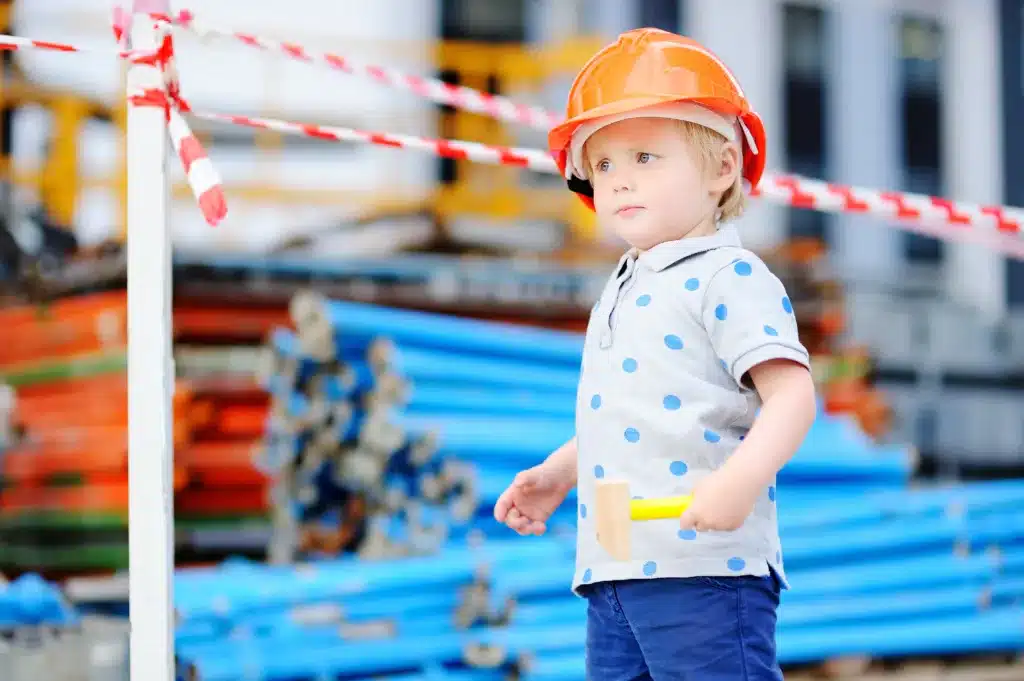
Little builder in hardhats with hammer working outdoors
Welcome to the world of parenthood, where the safety and well-being of your newborn take center stage. As a new parent, you may find yourself navigating uncharted territory, filled with joy, love, and the need for guidance. In this article, we will provide you with valuable newborn care hacks and essential baby safety tips to help you create a secure environment for your little one. We’ve covered you, from understanding your baby’s cues to baby-proofing your home.
Contents
Designing a safe and cozy nursery for your little one is essential for their well-being and your peace of mind. Start by choosing the right crib, mattress, and bedding that meet safety standards. Ensure the crib has sturdy rails and a firm, snug mattress. Organize the nursery efficiently, keeping frequently used items within easy reach.
Maintaining a comfortable temperature in your baby’s room helps promote better sleep and overall well-being. Use fans, air conditioners, or heaters appropriately to regulate the temperature. Remember that newborns are sensitive to extreme temperatures, so aim for a moderate and comfortable environment to prevent overheating or chilling.
Bathing your newborn can be a delightful bonding experience but requires special attention to ensure their safety and comfort. Select suitable bathing supplies and products, such as gentle baby soap and a soft washcloth. Create a baby-friendly bathing routine by maintaining a warm water temperature and using supportive bath seats or your arms to cradle your baby securely.
Understanding your newborn’s sleep patterns can help you establish a routine that supports their healthy development and provides you with much-needed rest. Newborns have shorter sleep cycles and spend a significant amount of time sleeping. They may wake frequently for feeding and diaper changes. Knowing these patterns will help you adjust your expectations and plan accordingly.
A consistent and soothing bedtime routine can help your baby relax and transition into a peaceful sleep. Start by establishing a regular bedtime and following calming activities such as a warm bath, gentle massage, and bedtime stories. These rituals will signal your baby that it’s time to wind down and prepare for sleep.
Creating a sleep-friendly environment for your baby promotes better sleep quality and reduces nighttime disturbances. Minimize noise and light in the room to create a soothing atmosphere. Use blackout curtains, white noise machines, or soft music to create a peaceful ambiance. Choose appropriate sleepwear and blankets to keep your baby comfortable and safe throughout the night.
Breastfeeding is a beautiful way to nourish your baby and establish a strong bond, but it may require some practice and knowledge. Start by learning proper latching techniques and positioning to ensure a comfortable feeding experience for both you and your baby. Seek assistance from lactation consultants or support groups if you encounter any difficulties. Remember to care for yourself by staying hydrated and maintaining a nutritious diet.
Whether you choose to bottle-feed or supplement with formula exclusively, mastering bottle-feeding techniques can simplify feeding routines. Select suitable bottles, nipples, and appropriate formulas for your baby’s age and needs. Follow proper guidelines for preparing and warming bottles to ensure your baby’s safety and nutritional well-being.
Diaper changing is a frequent task for new parents, and having a streamlined approach can save time and ensure your baby’s comfort. Gather all essential diapering supplies and organize them within reach. Use wipes or soft cloths to clean your baby when changing diapers gently. Lift your baby’s legs by gently grasping their ankles to minimize discomfort. Always apply a thin layer of diaper rash cream to protect your baby’s delicate skin.
Understanding your baby’s cues and how to respond can help you provide comfort during fussy times. Babies communicate through various signals, such as facial expressions, body movements, and sounds. By paying attention to these cues, you can identify if your baby is hungry, tired, or needs a diaper change.
Dealing with a crying baby can be challenging, but having a repertoire of calming techniques can help you soothe your little one. Try swaddling your baby snugly in a blanket to provide security. Gently rocking or carrying your baby can also help them relax. You can experiment with gentle rhythmic or white noise, such as a lullaby or a soothing shushing sound, to provide additional comfort.
Keeping your baby safe is a top priority; baby-proofing your home is crucial to creating a secure environment. Identify potential hazards such as sharp corners, electrical outlets, and cords. Use safety covers or outlet plugs to prevent accidents. Secure furniture to the wall to avoid tipping, and keep hazardous substances out of your baby’s reach.
Proper handling and transportation of your baby are essential for their safety. Selecting and installing the appropriate car seat is crucial. Ensure the car seat is properly installed, and always use it whenever you travel with your baby. Remember to support your baby’s head and neck when carrying them to prevent any injury.
As a new parent, it’s easy to neglect your rest, but taking care of yourself is vital for your well-being and ability to care for your baby. Whenever your baby sleeps, try to rest as well. Take short naps or relax during these moments to recharge yourself. If possible, seek support from loved ones or consider hiring help to give yourself some dedicated rest time.
Parenthood can bring about a range of emotions, and it’s important to seek emotional support during this transformative journey. Connect with other parents through local parenting groups, online forums, or social media communities. Sharing experiences, asking questions, and receiving advice from experienced parents can provide valuable support. If you struggle with your emotions, don’t hesitate to seek professional counseling to help you navigate this transition.
Taking care of your physical and mental well-being positively impacts your ability to care for your baby. Ensure you maintain a nutritious diet that provides you with the energy you need. Engage in gentle exercises like walking or yoga to stay active. Manage stress through relaxation techniques like deep breathing or meditation. Don’t forget to indulge in self-care activities that bring you joy and help you unwind.
Connecting with other parents can provide valuable support, information, and a sense of community during the early stages of parenthood. Join local parenting groups, attend classes, or participate in online forums. Engaging with these communities allows you to share experiences, ask questions, and learn from others who are going through similar experiences.
Building a solid support system with family and friends can help alleviate parenting challenges and provide a network
of assistance. Communicate your needs to your loved ones and allow them to offer their help. Organize regular visits or playdates to foster connections and share parenting responsibilities. Remember, you don’t have to do it alone—accepting support from those around you can make a significant difference in your parenting journey.
Capturing special moments and milestones allows you to create lasting memories of your baby’s growth and development. Invest in a good camera or use your smartphone to take high-quality photos. Create a baby journal to record milestones, funny anecdotes, and precious memories. Additionally, you can use milestone apps that provide prompts and reminders to document your baby’s achievements.
Amidst the challenges and busyness of parenting, it’s essential to slow down, be present, and cherish the precious moments with your baby. Practice mindfulness by fully immersing yourself in the joy and wonder of parenthood. Engage in bonding activities such as cuddling, playing, and talking to your baby. Remember that these early years are fleeting, and embracing the present allows you to create beautiful memories that will last a lifetime.
As you embark on this incredible journey of parenthood, armed with these life-saving hacks, you can confidently navigate the challenges and cherish the joys of caring for your newborn. Each section we’ve covered—from creating a safe environment to nurturing a healthy sleep routine, mastering feeding, and diapering techniques, and finding balance—provides you with valuable insights and strategies to make your parenting experience smoother and more fulfilling.
Remember that parenthood is a continuous learning process, and seeking guidance and support is okay. Trust your instincts, be patient with yourself and your baby, and celebrate the small victories. The love and care you provide will shape your baby’s world and create a strong foundation for their future.
Q1: How do I know if my baby gets enough milk during breastfeeding?
A: Watch for signs of adequate feedings, such as active sucking, swallowing sounds, and contentment after feeding. Monitor your baby’s weight gain and consult a healthcare professional with concerns.
Q2: When should I start baby-proofing my home?
A: It’s recommended to start baby-proofing your home before your baby crawls, usually around six to seven months. However, assessing potential hazards and taking necessary precautions is never too early.
Q3: How can I cope with sleep deprivation as a new parent?
A: Prioritize rest whenever possible by napping when your baby sleeps. Seek help from your partner, family, or friends to share nighttime responsibilities. Remember that sleep deprivation is temporary; seek support if you feel overwhelmed.
Q4: How often should I change my baby’s diapers?
A: Newborns typically need their diapers changed every two to three hours or when wet or soiled. Pay attention to your baby’s cues and adjust accordingly.
Q5: How can I manage my emotions and stress as a new parent?
A: Find healthy outlets to express your emotions, such as talking to a trusted friend or joining a support group. Engage in stress-reducing activities like exercise, deep breathing, or meditation. Don’t hesitate to seek professional help if needed.
Q6: What are some essential items to include in my diaper bag?
A: Diapers, wipes, changing pads, spare clothes, burp cloths, feeding supplies, pacifiers, and a small first-aid kit are essential items to pack in your diaper bag when you’re on the go.
Remember, every parent has a unique journey, and facing challenges and moments of uncertainty is normal. By equipping yourself with knowledge, seeking support, and practicing self-care, you can navigate the joys and trials of parenthood with confidence and grace.
Parenthood is a remarkable adventure filled with love, growth, and unforgettable moments. Embrace each stage, savor the milestones, and cherish your bond with your precious little one. You are embarking on a journey that will profoundly and beautifully shape your lives.
So, welcome to the world of parenthood! Embrace it with an open heart, mind, and a willingness to learn and grow alongside your baby. You’ve got this!
You may find this resource helpful for further information on newborn care and baby safety: Parents – Baby Care.

Jasbir Kapoor is an author, blogger, web and graphic designer, SEO expert, logo designer, and entrepreneur with an MBA and a background in English Literature. He is passionate about creating engaging content and beautiful, user-friendly websites, and is always seeking new opportunities to learn and grow.
[…] ⇒ Read More: Baby Safety Tips: Essential Guidelines for Ensuring Your Newborn’s Well-being […]
Leave a comment